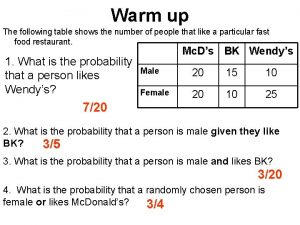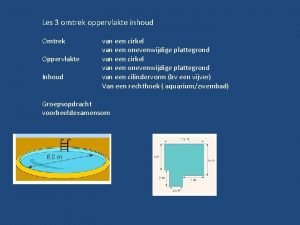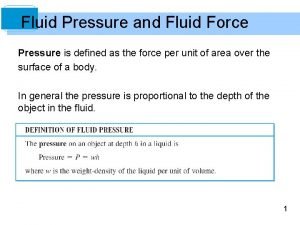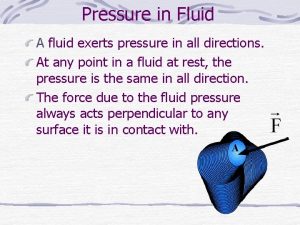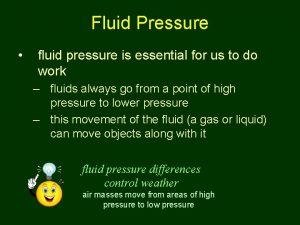7 5 Fluid Pressure and Forces Georgia Aquarium








- Slides: 8

7. 5 Fluid Pressure and Forces Georgia Aquarium, Atlanta Photo by Vickie Kelly, 2006 Greg Kelly, Hanford High School, Richland, Washington

What is the force on the bottom of the aquarium? 2 ft 1 ft 3 ft

If we had a 1 ft x 3 ft plate on the bottom of a 2 ft deep wading pool, the force on the plate is equal to the weight of the water above the plate. density depth pressure area All the other water in the pool doesn’t affect the answer!

What is the force on the front face of the aquarium? 2 ft Depth (and pressure) are not constant. 3 ft 1 ft If we consider a very thin horizontal strip, the depth doesn’t change much, and neither does the pressure. depth density area 0 2 ft 2 3 ft It is just a coincidence that this matches the first answer!

2 ft We could have put the origin at the surface, but the math was easier this way. 3 ft A flat plate is submerged vertically as shown. (It is a window in the shark pool at the city aquarium. ) Find the force on one side of the plate. Depth of strip: Length of strip: Area of strip: 6 ft density depth area

Normal Distribution: 13. 5% 34% 2. 35% 68% 95% 99. 7% “ 68, 95, 99. 7 rule” For many real-life events, a frequency distribution plot appears in the shape of a “normal curve”. Examples: The mean (or ) is in the middle of theofcurve. heights 18 yr. The old men shape of the curve is standardized scores determined by thetest standard deviation. lengths of pregnancies timemu for corn to pop x-bar sigma

Normal Distribution: 13. 5% 34% 2. 35% The area under the curve from a to b represents the probability of an event occurring within that range. “ 68, 95, 99. 7 rule” In Algebra 2 we used z-scores and a table of values to determine probabilities. If we know the equation of the curve we can use calculus (and our calculator) to determine probabilities: Normal Probability Density Function: (Gaussian curve)

Normal Distribution: The good news is that you do not have to memorize this equation! Example 6 on page 406 shows how you could integrate this function to predict probabilities. In real life, statisticians rarely see this function. They use computer programs or graphing calculators with statistics software to draw the curve or predict the probabilities. Normal Probability Density Function: (Gaussian curve) p



